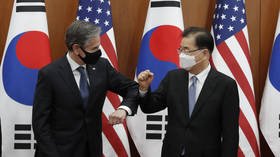US bid to lure Seoul into anti-China bloc will push Beijing and Pyongyang closer, making Korea a real Cold War flashpoint

North Korea is unhappy at America’s recent revision of restrictions on South Korea’s ballistic missiles, even though China is the target – and the move could have significant repercussions on the peninsula.
South Korean President Moon Jae-in recently visited the United States for his first summit with President Joe Biden. It proved to be a significant meeting, with Washington lifting its restrictions on the capabilities of Seoul’s ballistic missiles, allowing them to have an unlimited payload and range.
Also on rt.com Tell the truth, America… the G7 meeting is all about trying to contain the rise of ChinaUnsurprisingly, North Korea has been quick to denounce the move, which it has interpreted as an attempt to counter its own advancing capabilities (even if South Korea cannot go nuclear itself).
But even if North Korea sees opportunity in making a fuss, it’s not the target – in reality, that’s China. While the issue of North Korea loomed over the Biden-Moon meeting – as it always does on such occasions – this summit was a turning point, because it marked the formal beginning of Washington’s attempts to lockstep Seoul into an anti-China alliance. For all intents and purposes, North Korea has been put on the backburner by Biden, and there is little momentum here for now.
Instead, this meeting saw the White House attempt to push Moon Jae-in towards making a number of anti-China commitments, with the comprehensive joint statement mentioning a “free and open Indo-Pacific,” “freedom of navigation… in the South China Sea,” and most alarmingly for Beijing, “stability in the Taiwan Strait.” Although it did not refer to China by name at any point, and nor did it mention ‘red line’ issues such as Hong Kong or Xinjiang – in contrast to the detailed statement issued after Biden’s summit with Japanese PM Yoshihide Suga – the effort to get Seoul to ‘take a side’ is not going to go away.
By lifting the missile restrictions, South Korea now has the right to put China in range if it wishes and increase its military leverage, a key part of Washington’s containment strategy.
Of course, people will logically assume that as a US ally, South Korea has by default already ‘taken a side’. But it’s not that simple. What is described as the US-South Korea ‘alliance’ is, in fact, far narrower in scope and application than the relationship with Tokyo, which is more of a global partnership. Washington’s relationship with Seoul has traditionally only concerned the Korean Peninsula, which explains why so far the latter has not taken a side regarding Beijing and has publicly signalled that it does not want to do so. Biden is now calling for that to change.
Not surprisingly, there are several downsides to South Korea taking such a path, hence its hesitation in doing so. Geography has inevitably led to it having an extensive economic relationship with China. It is the country’s largest import and export partner. When the US asked Seoul to ban Huawei from its 5G networks a year ago, it simply ignored America’s requests.
Also on rt.com As US seeks geopolitical allies to contain China, South Korea is edging toward full sovereignty – guaranteed by its own missilesChina is also very sensitive towards Seoul siding against it. When the US and South Korea agreed to install the THAAD missile defence system in 2016 with advanced radar capabilities, Beijing considered its own national security to be at risk and punished Seoul with a spree of sanctions relating to trade, tourism, and even the K-Pop band BTS.
There’s also the perception that North Korea is China’s own ally. But again, things are not black and white. Although Mao once referred to China and North Korea as like ‘lips and teeth’ having fought together in the Korean War, the world has changed. Since the end of the Cold War, China’s foreign policy has moved away from unconditional backing of North Korea to ensuring stability on the peninsula and maintaining a prosperous relationship with the South.
Pyongyang’s nuclear program has been a point of contention between the two, and for a while Beijing even cooperated with Washington on tough sanctions that forced Kim Jong-un to negotiate.
However, at the same time, North Korea’s continued existence is important to China as a strategic counterweight against the US and as a fellow communist state. With the US now seeking to draw Seoul into an anti-China bloc, this may make Beijing contemplate its relationship with Pyongyang again. Just days after the Biden-Moon summit, China’s foreign minister went straight to the North Korean Embassy in Beijing and met with the ambassador (it isn’t possible for anyone to visit North Korea right now in any capacity). And he swiftly reaffirmed, “China has always viewed its relationship with the DPRK from a strategic perspective and deepened friendship and cooperation from a long-term perspective.”
There is a veiled message in there. North Korea’s importance to China will gain contemporary relevance in the face of strategic competition. For example, if the US is allowing Seoul to make bigger and longer-reaching missiles, why should China cooperate in helping to end North Korea’s ballistic missile programs if it keeps these powers in check?
China does not want to jettison its extremely lucrative relationship with Seoul, but if North Korea gains a new importance not seen since the Cold War, the traditional policy of ‘balancing’ between the two Koreas ought to be revised to a certain extent in order to meet the new strategic realities.
It’s likely Kim Jong-un will be very aware of this, and if he perceives his own leverage over China is increasing, then he will be very keen to play this situation out and strongarm more concessions from Beijing, something Kim Il-sung was adept at doing in the Cold War in manipulating the Sino-Soviet split for his own gain.
In this case, the Korean Peninsula may be about to become a Cold War flashpoint again, as both powers begin looking to exert their influence over their respective ‘partner’. But how far will Seoul go? And what risks will it take simply to please Washington? That remains to be seen.
Think your friends would be interested? Share this story!
The statements, views and opinions expressed in this column are solely those of the author and do not necessarily represent those of RT.















